NCERT Solutions Class 8 Maths Chapter 6 Squares and Square Roots
NCERT Class 8 Maths Chapter 6 Squares and Square Roots :
- NCERT Class 8 Maths Squares and Square Roots Exercise 6.1
- NCERT Class 8 Maths Squares and Square Roots Exercise 6.2
- NCERT Class 8 Maths Squares and Square Roots Exercise 6.3
- NCERT Class 8 Maths Squares and Square Roots Exercise 6.4
NCERT Class 8 Maths Exercise 6.1 (Page-96)
Q1. What will be the unit digit of the squares of the following numbers?
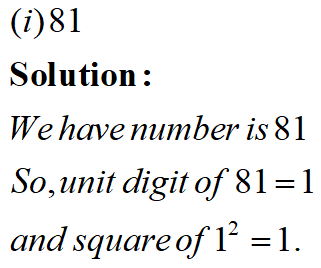
(ii)272
Solution :
\(\displaystyle \begin{array}{*{20}{l}} {We\text{ }have\text{ }number:\,272\text{ }} \\ {So,\text{ }unit\text{ }digit\,of\,272=2} \\ {and\text{ }square\text{ }of\,{{2}^{2}}=4~} \end{array}\)
(iii) 799
Solution :
\(\displaystyle \begin{array}{*{20}{l}} {We\text{ }have\text{ }number:\,799} \\ {So,\text{ }unit\text{ }digit\,of\,799=9} \\ {and\text{ }square\text{ }of\,{{9}^{2}}=81} \end{array}\)
(iv) 3853
Solution :
\(\displaystyle \begin{array}{*{20}{l}} {We\text{ }have\text{ }number:\,3853} \\ {So,\text{ }unit\text{ }digit\,of\,3853=3} \\ {and\text{ }square\text{ }of\,{{3}^{2}}=9} \end{array}\)
(v) 1234
Solution :
\(\displaystyle \begin{array}{*{20}{l}} {We\text{ }have\text{ }number:\,1234} \\ {So,\text{ }unit\text{ }digit\,of\,1234=4} \\ {and\text{ }square\text{ }of\,{{4}^{2}}=16} \end{array}\)
(vi) 20387
Solution :
\(\displaystyle \begin{array}{*{20}{l}} {We\text{ }have\text{ }number:\,20387} \\ {So,\text{ }unit\text{ }digit\,of\,20387=7} \\ {and\text{ }square\text{ }of\,{{7}^{2}}=49} \end{array}\)
(vii) 52698
Solution :
\(\displaystyle \begin{array}{*{20}{l}} {We\text{ }have\text{ }number:\,52698} \\ {So,\text{ }unit\text{ }digit\,of\,52698=8} \\ {and\text{ }square\text{ }of\,{{8}^{2}}=64} \end{array}\)
(viii) 99880
Solution :
\(\displaystyle \begin{array}{*{20}{l}} {We\text{ }have\text{ }number:\,99880} \\ {So,\text{ }unit\text{ }digit\,of\,99880=0} \\ {and\text{ }square\text{ }of\,{{0}^{2}}=0} \end{array}\)
(ix)12796
Solution :
\(\displaystyle \begin{array}{*{20}{l}} {We\text{ }have\text{ }number:\,12796} \\ {So,\text{ }unit\text{ }digit\,of\,12796=6} \\ {and\text{ }square\text{ }of\,{{6}^{2}}=36} \end{array}\)
(x) 55555
Solution :
\(\displaystyle \begin{array}{*{20}{l}} {We\text{ }have\text{ }number:\,55555} \\ {So,\text{ }unit\text{ }digit\,of\,55555=5} \\ {and\text{ }square\text{ }of\,{{5}^{2}}=25} \end{array}\)
Q2. The following numbers are not perfect squares. Give reason.
(i) 1057
Solution :

(ii) 23453
Solution :

(iii) 7928
Solution :

(iv) 222222
Solution :

(v) 64000
Solution :

(vi) 89722
Solution :

(vii) 222000
Solution :

(viii) 505050
Solution :

Q3.The squares of which of the following would be odd numbers?
(i) 431 (ii) 2826 (iii) 7779 (iv) 82004
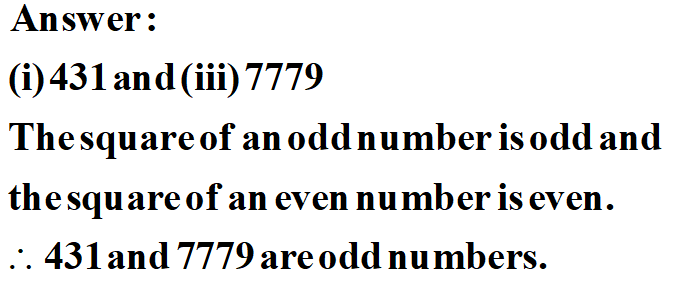
Q4. Observe the following pattern and find the missing digits.
\(\displaystyle \begin{array}{l}{{11}^{2}}=121\\{{101}^{2}}=10201\\{{1001}^{2}}=1002001\\{{100001}^{2}}=1...2...1\\{{10000001}^{2}}=...\end{array}\)
Solution :
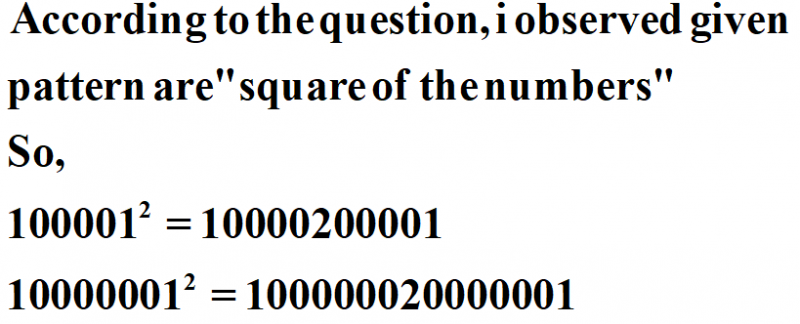
Q5.Observe the following pattern and supply the missing numbers.
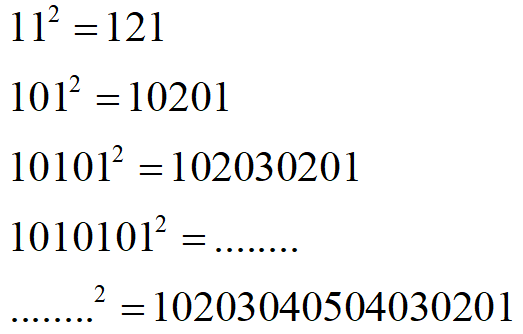
Solution :

Q6. Using the given pattern, find the missing numbers.
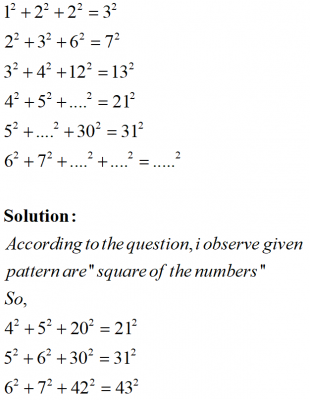
Q7.Without adding, find the sum.
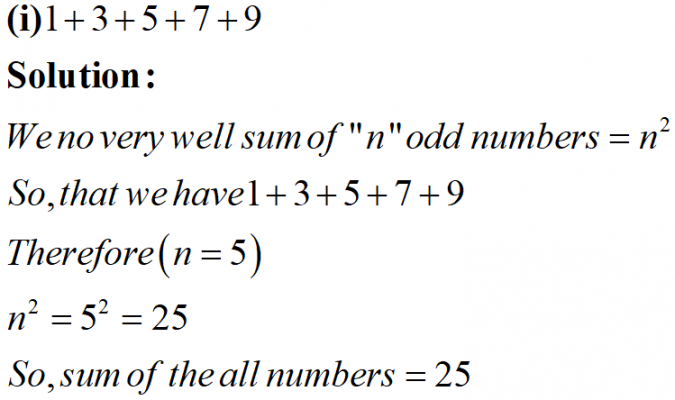
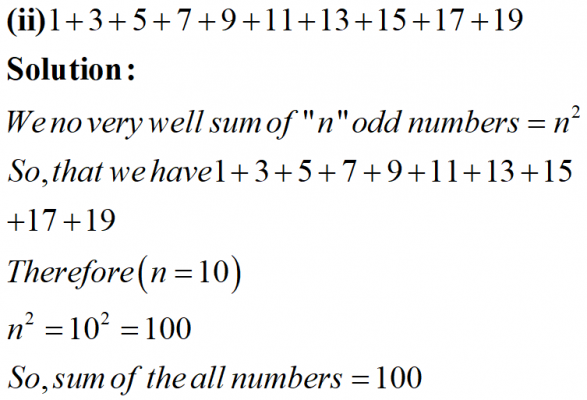
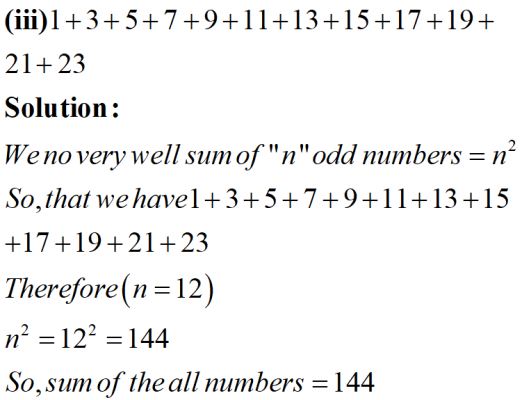
Q8. (i) Express 49 as the sum of 7 odd numbers.

(ii) Express 121 as the sum of 11 odd numbers.
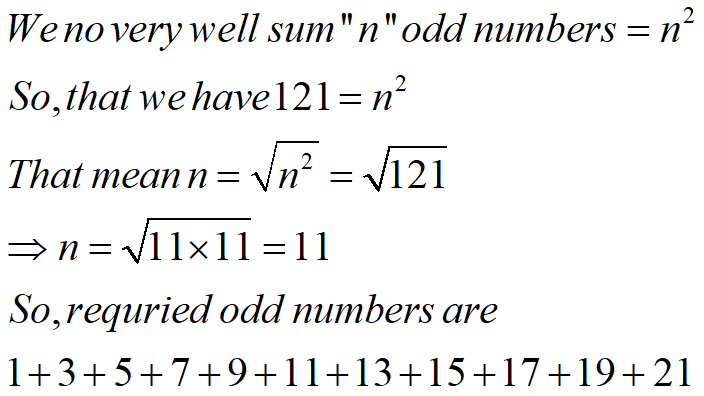
Q9. How many numbers lie between squares of the following numbers.

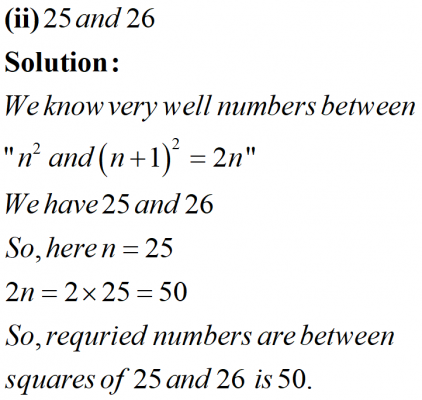

- NCERT Class 8 Maths Squares and Square Roots Exercise 6.1
- NCERT Class 8 Maths Squares and Square Roots Exercise 6.2
- NCERT Class 8 Maths Squares and Square Roots Exercise 6.3
- NCERT Class 8 Maths Squares and Square Roots Exercise 6.4
